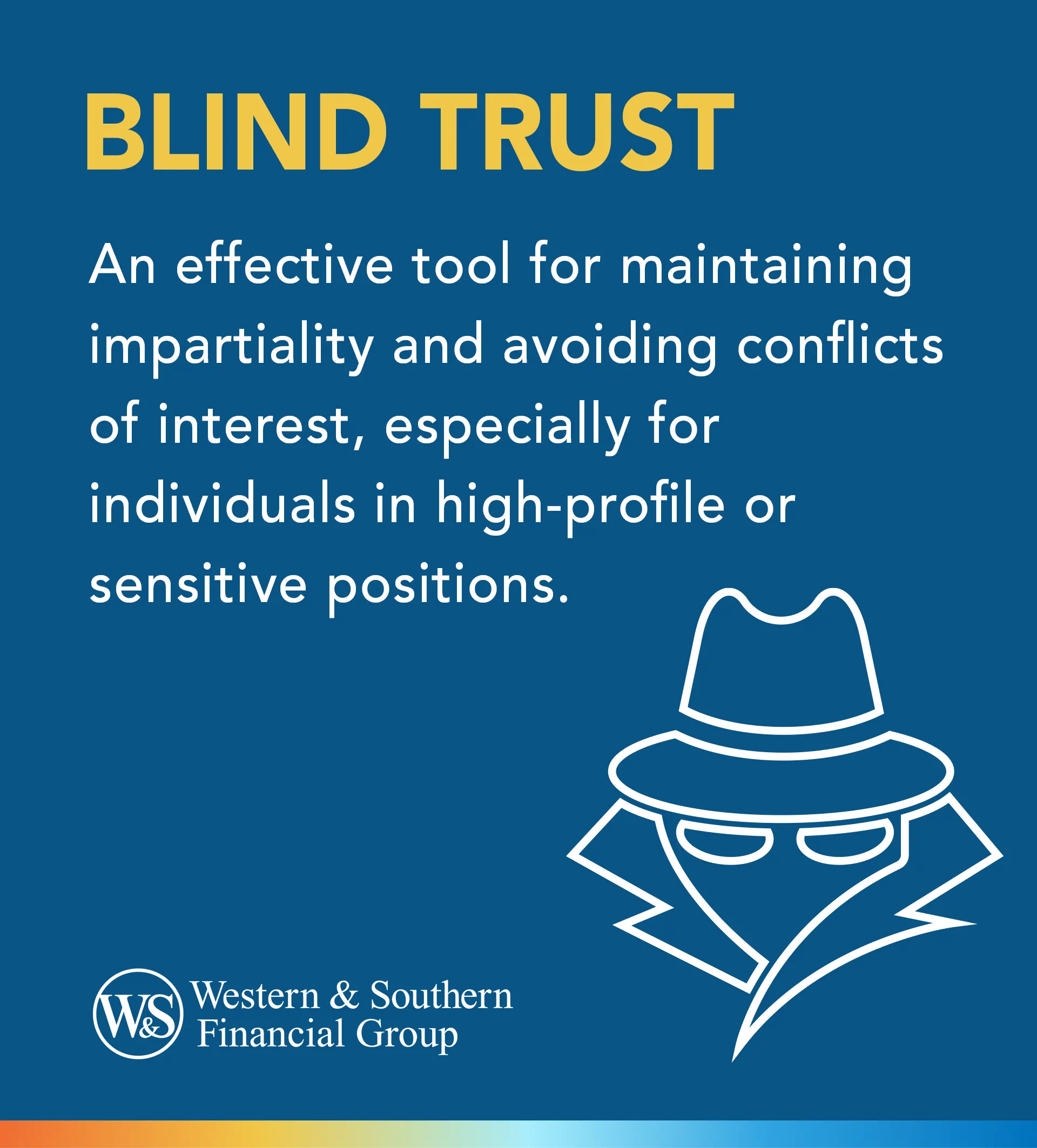

Key Takeaways
- Blind trusts offer a way to maintain impartiality and avoid conflicts of interest, particularly for public figures.
- They involve three key roles: the grantor who establishes the trust, the trustee who manages it, and the beneficiary who benefits from it.
- The two main types of blind trusts are revocable, which offers more flexibility, and irrevocable, which provides more separation.
- Despite their benefits in preventing conflicts and ensuring privacy, blind trusts also pose potential drawbacks, such as loss of control and dependence on the trustee.
- Before choosing a blind trust, consult legal and financial advisors to understand its implications, costs, and benefits thoroughly.
How Do Blind Trusts Work?
A blind trust helps prevent conflicts of interest by separating asset ownership from asset management. The trustee controls and manages the assets, while the beneficiary has no knowledge of or control over investment decisions.
To achieve this goal, three primary roles are involved.
| Role | Description |
|---|---|
| Grantor (Settlor) | The person who creates the blind trust and transfers assets into it. |
| Trustee | An independent third-party fiduciary, often a financial or legal professional, who manages the trust and its assets. |
| Beneficiary | The person or entity who receives income or principal distributions from the trust. |
Here's an overview of how blind trusts work:
- Establishment of the Trust: A trust agreement is created. It outlines the terms, conditions, duration, trustee powers, and how distributions will be made.
- Transfer of Assets: The grantor transfers assets into the trust, such as stocks, bonds, real estate, or business interests. After the transfer, the grantor cannot access information about or influence the management of those assets.
- Management of the Trust: The trustee has full discretion to buy, sell, and invest trust assets without input from the grantor or beneficiaries. The trustee must follow the trust agreement, comply with state and federal laws, and act in the beneficiaries’ best interests.
- Income Distribution: Beneficiaries receive distributions as outlined in the trust agreement. They do not know which assets are held in the trust or how they are managed.
- Termination of the Trust: The trust ends on a date or condition specified in the agreement. Remaining assets are distributed according to the trust terms.
Blind trusts are commonly used by politicians and public officials to separate personal financial interests from official responsibilities.
What Are the Types of Blind Trusts?
Blind trusts fall into two main categories: revocable and irrevocable..
Revocable Blind Trusts
A revocable blind trust allows the grantor to change the terms or cancel the trust during their lifetime. This option offers more flexibility if circumstances change.
Key Characteristics
- Flexibility: The grantor can update terms or change beneficiaries.
- Control: The grantor can revoke the trust at any time.
- Taxation: Trust assets remain part of the grantor’s estate. Income is taxed to the grantor.
Common Uses
- When the grantor wants the ability to make future changes.
- When a temporary arrangement is needed to help avoid potential conflicts of interest.
Irrevocable Blind Trusts
An irrevocable blind trust cannot be changed or revoked once it is established, unless beneficiaries agree. This structure creates stronger separation between the grantor and the assets.
Key Characteristics
- Stability: Terms cannot be changed by the grantor alone.
- Asset Protection: Offers stronger protection from creditors and legal judgments.
- Tax Treatment: Assets are generally removed from the grantor’s estate, which may reduce estate taxes.
Common Uses
- When complete separation between the grantor and assets is required.
- When setting up long-term arrangements for beneficiaries.
The right choice depends on how much control the grantor wants to retain. In both structures, beneficiaries do not know the specific assets held or how they are managed, which helps prevent conflicts of interest.
What Are the Benefits of a Blind Trust?
A blind trust keeps beneficiaries unaware of how assets are managed. This structure offers several advantages:
- Prevention of Conflicts of Interest: A blind trust reduces potential conflicts by keeping beneficiaries unaware of and unable to control the assets. This supports integrity and public confidence.
- Asset Protection: It helps protect assets from creditors, legal claims, and lawsuits. In an irrevocable blind trust, assets are generally removed from the grantor’s estate.
- Financial Privacy: Beneficiaries maintain confidentiality because they do not know the trust’s specific holdings. This limits public scrutiny of their finances.
- Impartiality and Compliance: A blind trust helps individuals remain objective in professional roles when decisions could affect personal finances. It also supports compliance with ethical and legal standards.
- Tax Advantages: Irrevocable blind trusts may offer tax benefits since assets are typically excluded from the grantor’s taxable estate.
- Estate Planning and Wealth Transfer: Blind trusts can also be a strategic tool in estate planning. They support organized wealth transfer and may help reduce estate tax exposure.
- Reputation Management: Using a blind trust can show a commitment to ethical conduct and avoiding conflicts of interest.
A blind trust offers unbiased asset handling to prevent conflicts of interest. Start Your Free Plan
What Are the Potential Drawbacks of a Blind Trust?
Blind trusts can help prevent conflicts of interest and protect financial privacy. However, they also come with trade-offs:
- Loss of Control: Once assets are transferred into a blind trust, the trustee has full authority over management, investment decisions, and asset sales.
- Dependence on Trustee: The trust’s outcome depends on the trustee’s skill and ethics. Mismanagement or misconduct could result in financial loss, and legal remedies may be limited.
- Limited Flexibility: Irrevocable blind trusts generally cannot be changed. Accessing assets or modifying terms before termination is difficult, which can create challenges during emergencies or major life changes.
- Setup and Maintenance Costs: Legal fees, trustee fees, and ongoing administrative expenses can make blind trusts costly to establish and maintain.
- Tax Implications: Tax treatment varies. In some cases, taxes may be unfavorable. For example, with revocable blind trusts, the grantor typically remains responsible for income taxes on trust earnings.
A blind trust may help address conflicts of interest, but the loss of control, reliance on a trustee, costs, and complexity may not suit everyone. Carefully weigh the pros and cons and speak with legal and financial professionals before making a decision.
How Much Does a Blind Trust Cost?
The cost of setting up and maintaining a blind trust varies based on its complexity, the assets involved, the state where it is created, and the professionals hired to establish and manage it. Below is a general overview of common costs:
Setup Costs
- Legal Fees: An attorney drafts the trust agreement. Fees can range from a few thousand dollars to tens of thousands, depending on complexity and the attorney’s rates.
- Filing Fees: Some states charge fees to file trust documents with the appropriate agency.
Ongoing Costs
- Trustee Fees: Trustees charge either a flat annual fee or a percentage of trust assets for managing and administering the trust. Costs vary based on the trustee and the size and complexity of the trust.
- Investment Management Fees: If assets are invested, additional fees may apply. These are often a percentage of assets under management or a flat fee.
- Administrative Costs: Ongoing expenses may include accounting, tax preparation, and record keeping.
- Taxes: Income generated by trust assets is generally subject to income tax, either at the trust level or the beneficiary level, depending on the trust structure.
Miscellaneous Costs
- Auditing and Compliance Costs: Some trusts require periodic audits or ongoing legal compliance, which can increase expenses.
- Dissolution Costs: When the trust ends, there may be costs related to distributing assets and formally closing the trust.
Because costs can vary significantly, request detailed estimates from attorneys, trustees, and other professionals before moving forward.
Is a Blind Trust Right for You?
Whether a blind trust makes sense depends on your circumstances, responsibilities, and goals.
Conflict of Interest
If you hold a public or high-profile role, such as a political office, a blind trust may help reduce concerns about conflicts of interest or improper influence.
Privacy and Asset Protection
If you want greater financial privacy or want to help protect assets from creditors or public scrutiny, a blind trust can provide a structured way to separate yourself from investment decisions.
Legal and Ethical Compliance
Judges, government employees, and corporate executives may need to follow strict rules regarding financial holdings. A blind trust can help meet those requirements and reduce legal risk.
Tax Considerations
In some cases, a blind trust may offer tax advantages. If reducing tax liability is a priority, it may be worth reviewing how a trust would be taxed in your situation.
The decision is highly personal. Review your professional obligations, long-term goals, and the costs involved. Speak with qualified legal and financial professionals to understand how a blind trust would affect your assets before making a decision.
Final Thoughts
A blind trust can help separate asset management from personal oversight when conflicts of interest or privacy concerns arise. Because trusts are not one size fits all, the right option depends on your goals, family needs, and desired level of control. Review the available trust structures and speak with qualified professionals to choose an approach that fits your overall financial strategy.
Blind trusts keep you uninvolved in asset management to prevent conflicts of interest. Start Your Free Plan
Frequently Asked Questions
Do I need a lawyer to set up a blind trust?
What are the tax implications of a blind trust?
The tax treatment of a blind trust depends on the type of trust, where it is established, and the terms of the agreement. In a revocable blind trust, the grantor typically remains responsible for taxes, while an irrevocable blind trust is usually treated as a separate tax entity, and beneficiaries may owe taxes on distributions. Because the rules can be complex, it is wise to consult a trusts and estates attorney and a certified public accountant before setting one up.
























